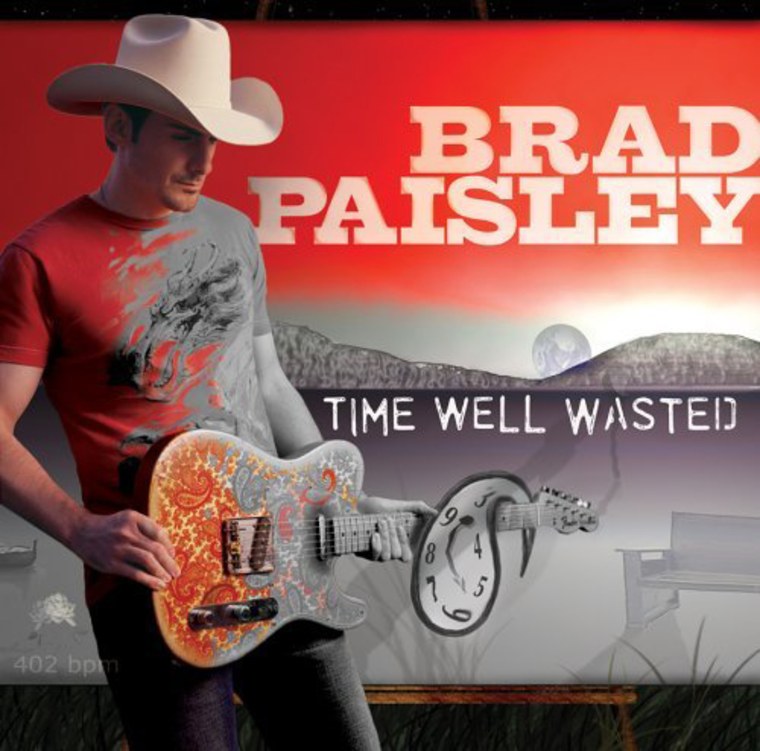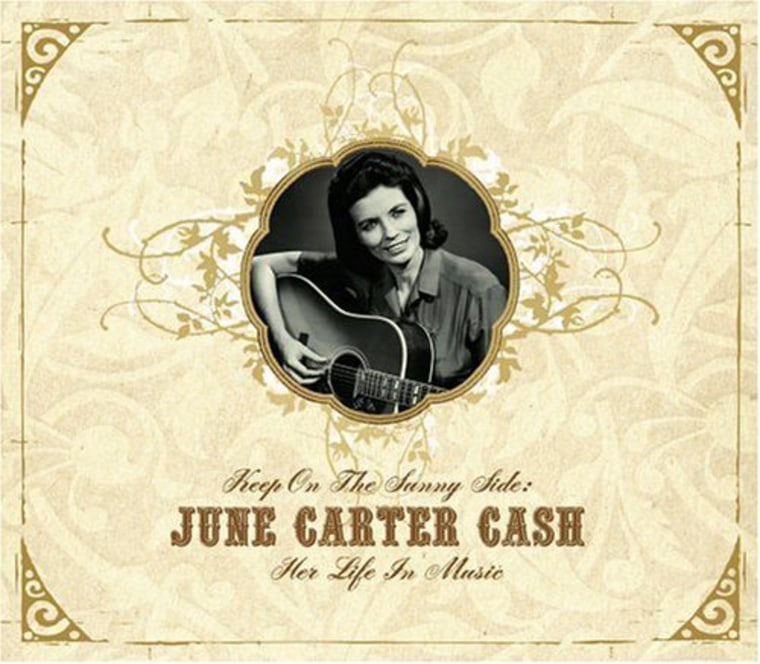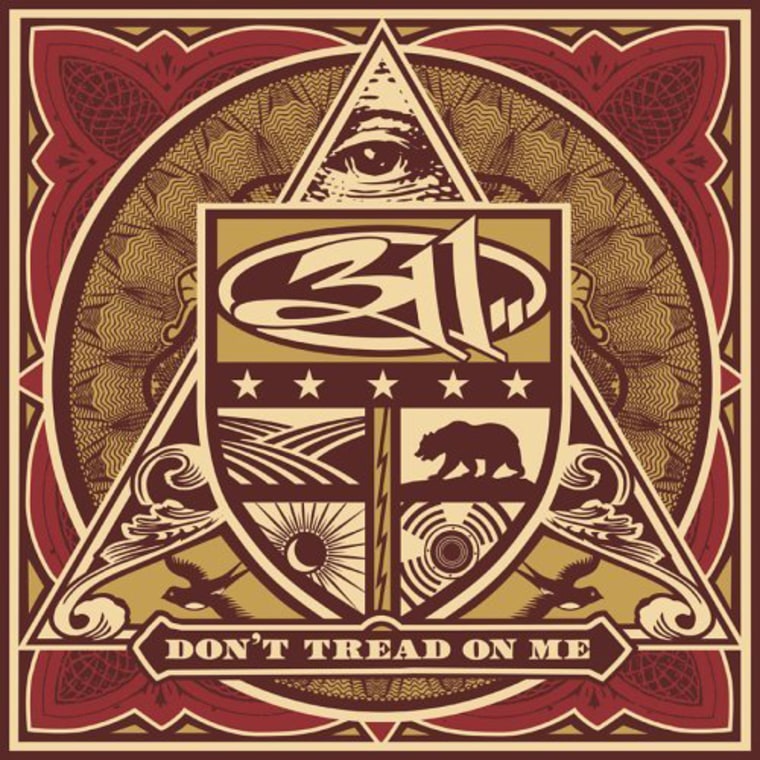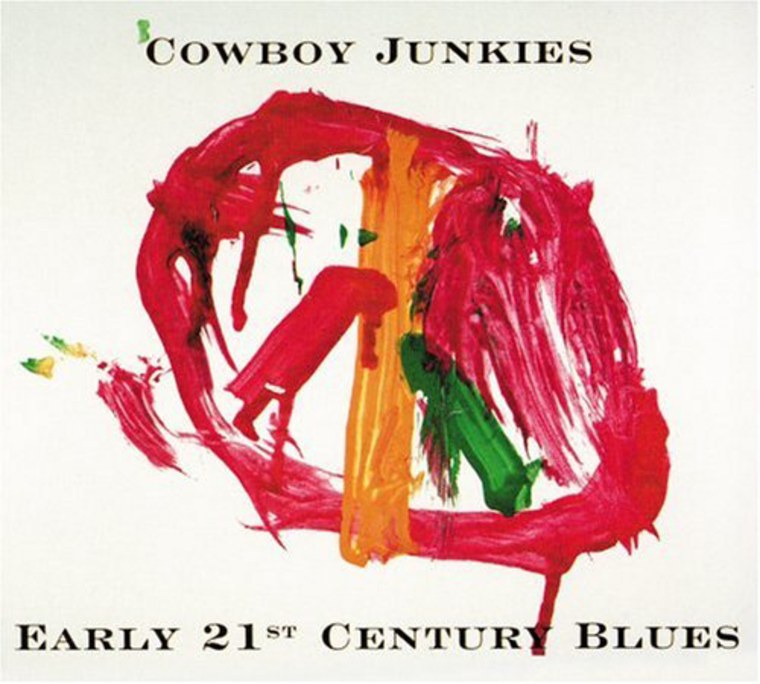If you like country music, this week offers you a treasure trove. Not only is there a new humor-laced album from Brad Paisley, but there's also the first retrospective of June Carter Cash's music as well as a Johnny Cash box set. For rock fans, 311 has put the dreaded rock-rap behind them in favor of some really great softer tunes. Rodney Crowell has something political to say on his latest CD. Cowboy Junkies disappoint with their latest CD — you’ve heard one song on this CD, you’ve basically heard them all. Finally, a couple of really strong gospel releases from Marvin Sapp and Sounds of Blackness.
Brad Paisley, “Time Well Wasted”Brad Paisley is lauded as the heir to country greats like Merle Haggard and George Jones, as well to new traditionalists like George Strait and Alan Jackson. He’s actually closer to Roy Clark and Jerry Reed, two performers known as much for their impressive guitar playing and cornpone humor as for their singing and songwriting. Paisley’s latest, “Time Well Wasted,” strengthens that connection.

For example, the record’s “I’ll Take You Back” features a rolling guitar hook reminiscent of Reed’s “She Got the Goldmine (I Got the Shaft).” “Time Warp,” on the other hand, is a light-speed, chops-heavy instrumental in the mold of Clark barn-burners such as “El Cumbanchero.” In the past, Paisley’s wisecracking has been marred by self-consciousness, but “Time Well Wasted” shows that, like Clark and Reed, he has a knack for offhanded parody. “Cornography,” for example, is an Opry radio play that features Jones, Little Jimmy Dickens, Bill Anderson and Dolly Parton. Like a sketch from “Hee Haw,” the tongue-in-cheek track flirts with bad taste (“He turned around to see two huge 38s pointed right in his face,” says Dickens).
Clark and Reed had TV and the movies to advance their personas, and it’s probably only a matter of before Paisley is afforded the same opportunity. Come to think of it, he does look a bit like Bob Saget ... hmmm.—Paul V. Griffith
June Carter Cash, “Keep On The Sunny Side — Her Life In Music”
Johnny Cash, “The Legend”

June Carter Cash was an actress, an author and the love of Johnny Cash’s life. She also assumed a prominent place in country music’s most famous family tree, and “Keep On The Sunny Side” nicely summarizes her pioneering role as a singer-songwriter.
The two-CD, 40-song set is one of two new anthologies from the House of Cash on the 50th anniversary of Johnny Cash’s first single. “The Legend” presents highlights from his vast catalog in a handsome four-CD boxed set.
But while Johnny Cash has been the subject of several previous retrospectives, “Sunny Side” is the first comprehensive compilation of his wife’s best work. The breadth of performances from 1939 to 2003 is moving: A 10-year-old June Carter jauntily sings “Oh! Susannah!” (she pronounces it “Susiannah”), and a failing Mrs. Cash leads a regal rendition of her family’s signature tune “Keep On The Sunny Side” shortly before her death.
Material is drawn from Carter Cash’s three solo albums, and from performances with Johnny Cash and others, including her sisters and mother, country music matriarch Maybelle Carter. Carter Cash’s bracing, unvarnished vocals are as earthy as the soil in her native Appalachia, and an obvious influence on such later performers as Loretta Lynn, Dolly Parton and countless other women who have sung mountain music.
The young Carter Cash’s hillbilly humor makes several songs sound dated, but others remain timeless. She’s helped by hot picking from Chet Atkins on several cuts, and there’s some lovely harmony singing by the Carter sisters — including four-part yodeling on “Foggy Mountain Top.”
While “The Legend” tends to duplicate other compilations, it’s hard to go wrong with 104 songs by Johnny Cash. Included is an entertaining disc of performances with family and friends ranging from U2 and Elvis Costello to Ray Charles and Billy Joe Shaver (the marvelous “You Can’t Beat Jesus Christ,” one of seven previously unreleased cuts).
Also new is a Johnny-June demo duet that closes the set. They sound weary but wise and larger than life, which makes for a fitting finale.—Steven Wine
311, “Don’t Tread on Me,”

By reuniting with producer Ron Saint Germain on their latest disc, “Don’t Tread on Me,” 311 appears to be looking to recapture some of the magic that blessed the band’s eponymous, triple-platinum album, which Germain produced in 1995.
They’ve succeeded. The title track (and first single) is an excellent tune that throws back to “311’s” infectious hooks and hard rock crunch/reggae power. Surprisingly, aside from this track and the angst-filled “Solar Flare,” most of the tracks are relaxing, softer melodies that are the opposite of the cliched rap-rock 311 championed in early ’90s.
Nick Hexum and S.A. Martinez provide a one-two vocal punch that features a congruent crooning ability many rock bands lack. Guitarist Tim Mahoney, drummer Chad Sexton, and bassist P-Nut have perfected their reggae/rock sound over the years to a tee, as showcased in the songs “Whiskey and Wine” and “Speak Easy.”
The track “There’s Always an Excuse,” which combines elements from every 311 album to date, will win over even the most jaded listener with it’s ever changing harmony. Starting with soft acoustics, peaking with hard rock and pianos, then ending with a bright solo, the track covers more musical ground in five minutes than the band has in 10 years.
One of the most enjoyable tracks, “Speak Easy,” a soft oceanic melody with a Caribbean vibe, comes complete with steel drums and a soothing wah-wah guitar effect that would make Jamaica proud.—Vincent Cherubino
Rodney Crowell, “The Outsider” With “The Outsider,” Rodney Crowell has delivered an album for anyone feeling disaffected with the modern world and its politics.
At times funny, other times thought-provoking, frequently angry and nearly always rocking, Crowell follows in the footsteps of icons like Woody Guthrie and Bob Dylan who made great music while also commenting on current events.
“Give to me my Aspen winter/Sorry ’bout the World Trade Center,” Crowell sings in “The Obscenity Prayer,” a song that perfectly embodies the philosophy of many self-centered people who may feel the complexities of the modern world are beyond their reach. “I can’t help the ones in need/I’ve got my own mouth to feed.”
On “Don’t Get Me Started,” perhaps the song most tightly connected with current events, Crowell takes the position of a person looking to unwind at a bar.
“When the coalition army doesn’t come to your aid/You might as well face it there’s no money to be made,” he sings. “I had a dream last night I was the secretary of defense/And I came to the conclusion war doesn’t make any sense.”
When the cover of Dylan’s “Shelter from the Storm” comes at track 10, it plays almost like a prayer. And with Emmylou Harris on backing vocals, the song takes on an even more ethereal quality.—Scott Bauer
Cowboy Junkies, “Early 21st Century Blues”

When the Cowboy Junkies get the blues, you shouldn’t expect much uptempo music.
In that regard, “Early 21st Century Blues” is right on target.
Unfortunately, the Junkies remain stuck in the same languid groove throughout the disc, making the next song sound much like the one that preceded it.
And that apparent unwillingness of the band to break out of the mold and try something in unfamiliar musical territory is limiting and ultimately disaffecting for the listener.
Even when the Junkies take on other peoples’ work, as nine of the 11 tracks on “21st Century Blues” are, they all come out sounding pretty much the same.
The songs end up sounding better in isolation than they do strung together on the album.
It’s a joy and somewhat of a shock when, on the 10th song, the Junkies pick it up a notch with John Lennon’s “I Don’t Want to be a Soldier,” featuring Kevin Bond (aka Rebel) rapping new lyrics over the lesser-known Lennon tune.
Hearing rapping in a Cowboy Junkies song is a surprise, but somehow it works.
If only they would take more risks like that, this disc and their music would be all the better for it.—Scott Bauer
Marvin Sapp, “Be Exalted”
“Be Exalted” is an entry from the diary of Marvin Sapp that’s designed to inspire refreshing praise and joy.
It’s jam-packed with danceable joints exalting the power of Christ’s name and encouraging submission to God’s will — as in “Be it Unto Me.” “Changed” is an airy, uptempo declaration of rebirth that will ring true in the heart of every believer. One of the album’s few ballads, “He Won’t Fail,” is a touching word of encouragement that starts off with an R&B feel and works it’s way to a soaring gospel chorus of worship and adoration.
The only complaint: Sapp’s cover of Rudolph Stanfield Jr.’s “Perfect Peace” is not an inspired new musical interpretation of the classic, even with Donald Lawrence producing. Fortunately, the original is so beautiful, it bears repeating.—Aimee Maude Sims
Sounds of Blackness, “Unity” The Sounds of Blackness is a well-respected vocal ensemble that’s been around for more than 35 years. But if they’re looking to rekindle the success they’ve enjoyed in past years, they’ll need to be more forward-looking than their latest project, “Unity.”
The new album has power-vocalist Ann Nesby back at the vocal helm and Gary Hines, one of the group’s original members, is still writing the songs. Unfortunately, the result is a predictable album. The first single, “Heaven,” is encouraging, but platitudes like “We Must stay strong/Encourage our brother/In times like these/We need one another,” abound.
The album begs the question: How can a group whose big single “Be Optimistic” assaulted the airwaves in the early ’90s because of its fresh sound and relevant lyrics, attract new listeners? Even the album’s theme, a call to unity, sounds like a throwback to the late ’80s.
“Unity” will surely please Sounds of Blackness loyalists: it is everything one has come to expect from the inspirational group. But those with greater expectations may be disappointed.—Aimee Maude Sims